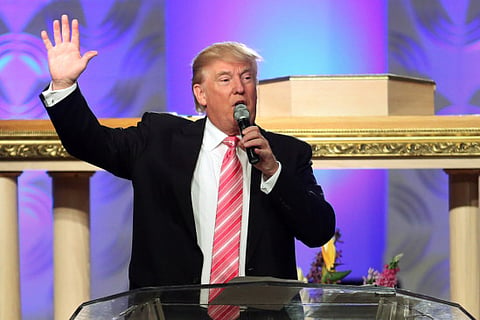Identity politics run amok
Today’s political environment is no longer about argument or discussion; it’s about trying to put your opponents into the box of the untouchables

Once, I seem to recall, we had philosophical and ideological differences. Once, politics was a debate between liberals and conservatives, between different views of government, different views on values and America’s role in the world.
But this year, it seems, everything has been stripped down to the bone. Politics in America is dividing along crude identity lines — along race and class. Are you a native-born white or are you an outsider? Are you one of the people or one of the elites?
Politics is no longer about argument or discussion; it’s about trying to put your opponents into the box of the untouchables.
Donald Trump didn’t invent this game, but he embodies it. His advisers tried to dress him up last Wednesday afternoon as some sort of mature summiteer. But he just can’t be phoney. By his evening immigration speech he’d returned to the class and race tropes that have defined his campaign: that the American government is in the grips of a rich oligarchy that distorts everything for its benefit; that the American people are besieged by foreigners, who take their jobs and threaten their lives.
It’s not that these two ideas are completely wrong. The rich do have more influence. There are indeed some foreigners who seek to harm us. It is just that Trump (like other race and class warriors) takes these kernels of truth and grows them into a lie.
Safer streets
Trump argues that immigration has sown chaos across middle-class neighbourhoods. This is false. Research suggests that the recent surge in immigration has made America’s streets safer. That’s because foreign-born men are very unlikely to commit violent crime.
According to one study, only 2 or 3 per cent of Mexican-, Guatemalan- or Salvadoran-born men without a high school degree end up incarcerated, compared with 11 per cent of their US-born counterparts.
Trump argues that the flood of immigrants is taking jobs away from unskilled native workers. But this is mainly false, too. There’s an intricate debate among economists about this, but if you survey the whole literature on the subject you find that most research shows immigration has very little effect on native wage or unemployment levels. That’s because immigrants flow into different types of unskilled jobs. Unskilled immigrants tend to become maids, cooks and farmworkers — jobs that require less English. Unskilled natives tend to become cashiers and drivers. If immigrants are driving down wages, it is mostly those of other immigrants.
Trump claims the rich benefit from immigration while everyone else suffers. Doctors get cheap nannies, everyone else gets the shaft. This is false, too. The fact is, a vast majority of Americans benefit. A study by John McLaren of the University of Virginia and Gihoon Hong of Indiana University found that each new immigrant produced about 1.2 new jobs, because immigrants are producers and consumers and increase overall economic activity.
A report from the Partnership for a New American Economy found that immigrants accounted for 28 per cent of all new small businesses in 2011. Between 2006 and 2012, over 40 per cent of tech start-ups in Silicon Valley had at least one foreign-born founder.
The cities that are doing best economically work hard to attract new immigrants because the benefits are widely shared. As Ted Hesson points out in The Atlantic, New York, Chicago, Houston and Los Angeles account for about 20 per cent of US economic output, and in those places, immigrants can make up as much as 44 per cent of the total labour supply.
Distortions
Identity politics distorts politics in two ways. First, it is Manichaean. It cleanly divides the world into opposing forces of light and darkness. You are a worker or an elite. You are American or foreigner.
Seeing this way is understandable if you are scared, but it is also a sign of intellectual laziness. The reality is that people can’t be reduced to a single story. An issue as complex as immigration can’t be reduced to a cartoon. It is simultaneously true that immigration fuels American dynamism and that the mixture of mass unskilled immigration and the high-tech economy threatens to create a permanent underclass.
Second and most important, identity politics is inherently the politics of division. But on most issues — whether it is immigration or the economy or national security — we rise and fall together. Immigration, even a reasonable amount of illegal immigration, helps a vast majority of Americans. An economy that grows at 3 per cent would help all Americans.
Identity politics, as practised by Trump, but also by others on the left and the right, distracts from the reality that we are one nation. It corrodes the sense of solidarity. It breeds suspicion, cynicism and distrust.
Human beings are too complicated to be defined by skin colour, income or citizenship status. Those who try to reduce politics to these identities do real violence to national life.
— New York Times News Service
David Brooks is the author of The Road to Character. He also teaches at Yale University and is a member of the American Academy of Arts and Sciences.


